Key takeaways:
- Engaging with skeptics through personal stories can transform the conversation about reparations into relatable, human experiences.
- Addressing misconceptions and fostering open dialogue is essential for understanding the complexities of reparations and promoting empathy.
- Building trust and patience in discussions can help bridge differing perspectives and encourage collaborative understanding on the topic of reparations.

Understanding reparations politics
Reparations politics is a complex field that encompasses historical injustices, economic disparity, and the ongoing effects of systemic racism. Personally, I’ve found that understanding the roots of the reparations debate often reveals deep emotional layers for both supporters and skeptics. For instance, have you ever considered how personal stories shape our views on these critical issues? They can make the data come alive, transforming abstract concepts into profoundly human experiences.
At its core, reparations politics invites us to grapple with difficult truths about our past and present. When I engage with skeptics, I often share my own family’s history—how my ancestors faced discrimination and what it meant for their opportunities. This turns the conversation into something relatable and tangible. It’s essential to ask: how do we reconcile our current societal structure with the injustices that continue to affect marginalized communities?
Moreover, the discussion surrounding reparations isn’t just about monetary compensation; it’s about acknowledgment, healing, and justice. Reflecting on conversations I’ve had, I often ask skeptics what justice looks like to them. This question usually opens up a more profound dialogue about accountability and moral responsibility, emphasizing that reparations go beyond economics to touch the very fabric of our society and values.
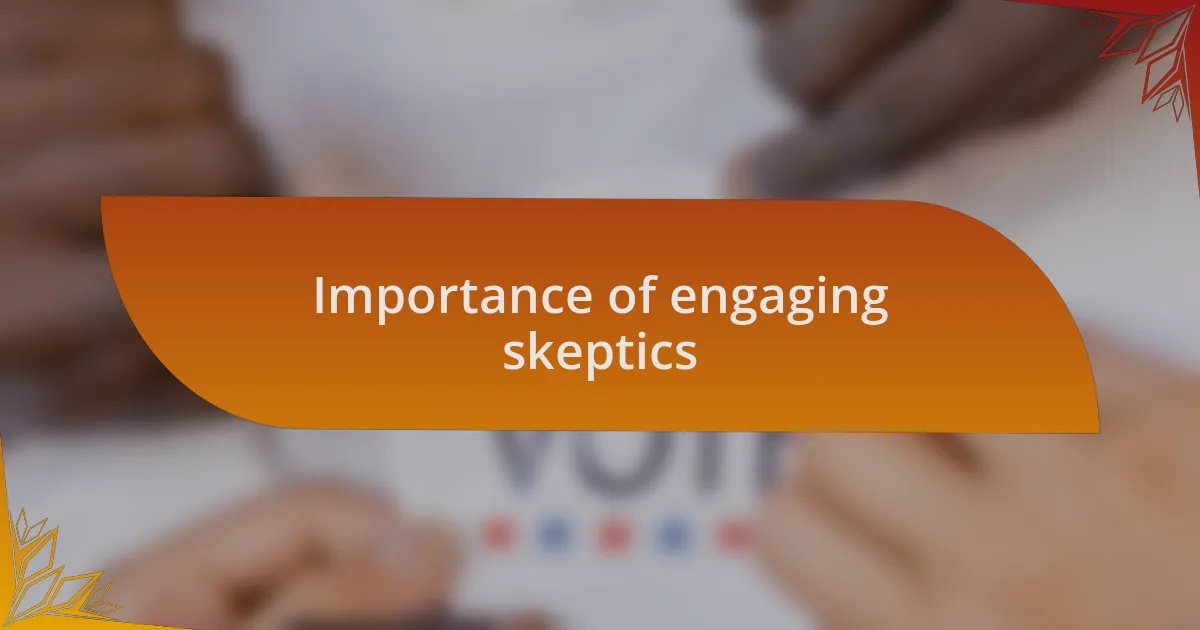
Importance of engaging skeptics
Engaging skeptics is crucial because it fosters a deeper understanding of the complexities surrounding reparations. I’ve sat across the table from many who firmly oppose the idea, and I’ve found open discussions to be enlightening. One time, a skeptic challenged the feasibility of reparations, so I shared how other nations have successfully navigated similar challenges. It encouraged a respectful exchange of ideas that moved beyond mere disagreement.
Addressing skepticism also allows us to address common misconceptions head-on. I remember a conversation where someone believed that reparations would simply create resentment among different communities. This misconception is not only misguided but overlooks the potential for restorative justice. How can we heal as a society if we shy away from acknowledging our past?
Moreover, engaging with those who doubt the merits of reparations can pave the way for collaboration and mutual understanding. In one instance, I encouraged a skeptic to participate in a community forum, where they could hear firsthand accounts of those affected by injustices. That experience sparked a shift in their perspective, illustrating how the dialogue can be transformative, shaping not only minds but also hearts.
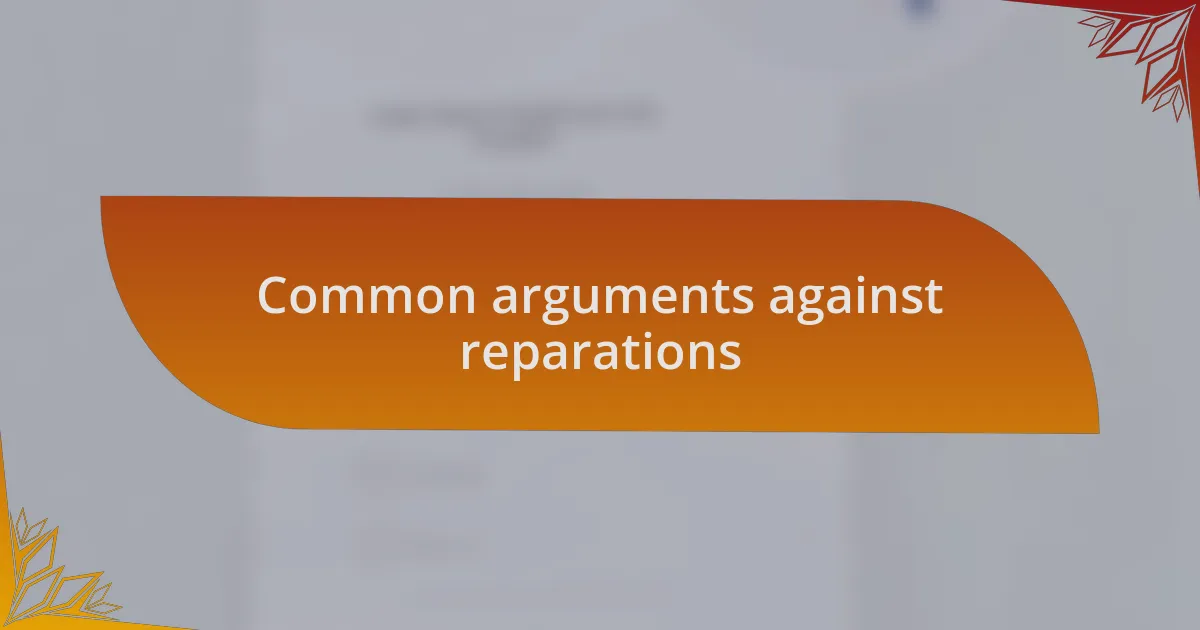
Common arguments against reparations
One common argument against reparations is the belief that it’s unfair to hold current generations accountable for past injustices. I once had a heated debate with someone who felt that many people today weren’t even directly involved in those wrongdoings. It struck me that while they were focusing on individual innocence, we were missing a larger point: the systemic structures that perpetuate inequality still exist today. How do we reconcile that?
Another argument I frequently encounter is the question of how to fairly distribute reparations. During a community discussion, a skeptic argued that it would be impossible to determine who deserves compensation and how much. I found it fascinating how this concern often overshadows the core issue—acknowledging historical wrongs—when, in reality, making reparations could set a precedent for addressing other forms of injustice. Isn’t it worth exploring, even if difficult?
Some skeptics also argue that reparations might lead to division rather than unity in society. I’ve faced this perspective when discussing the topic with friends who feel reparations would only emphasize racial differences. I believe this fear stems from a misunderstanding of reparations—that it’s about healing and creating a more equitable society rather than fostering resentment. How can we move forward together if we never address the wounds of our past?
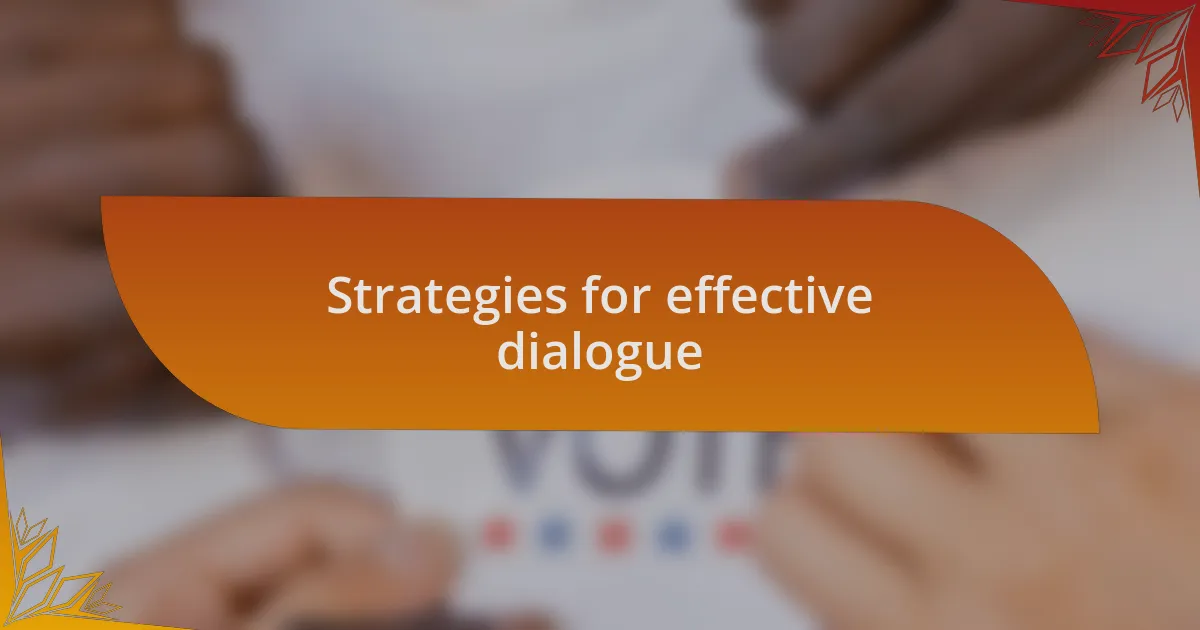
Strategies for effective dialogue
Engaging in effective dialogue requires creating a safe space where all participants feel heard. I once participated in a workshop where we openly shared our personal stories about systemic injustices. This not only humanized the discussion but allowed skeptics to see the real-life impact of historical grievances. How often do we miss the emotional weight behind statistics?
It’s important to ask open-ended questions that encourage deeper thinking. In a recent conversation with a skeptic, I asked, “What does justice look like to you?” This simple query led to a surprising exchange of ideas, revealing common ground in our desires for a fair society, despite differing views on reparations. It reminded me that dialogue isn’t about winning arguments; it’s about understanding perspectives.
Additionally, I find it helpful to address misconceptions head-on without being confrontational. For instance, I often clarify that reparations aren’t just about monetary compensation but can take the form of policy changes and community investments. This approach tends to diffuse tension and invites a broader discussion. How can we shift the focus from individual blame to collective responsibility? That’s the crux of the conversation.
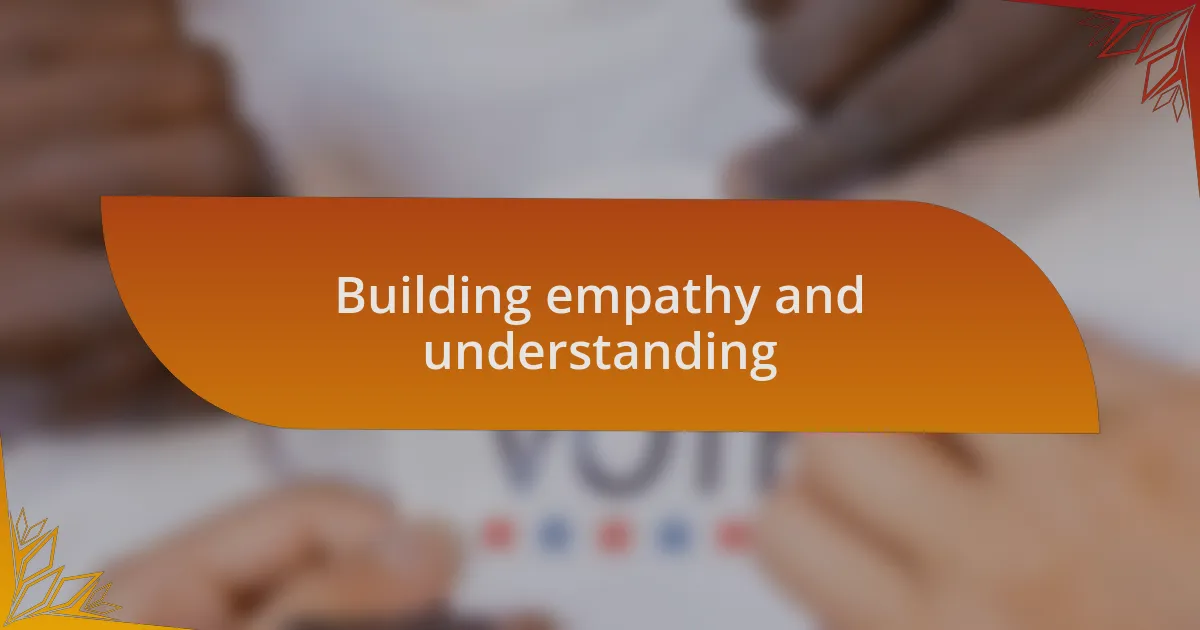
Building empathy and understanding
Building empathy and understanding requires stepping into the shoes of others, something I experienced during a local community event. Listening to the stories of those directly affected by historical injustices stirred something within me—I began to see the world through their eyes. How often do we truly listen, rather than preparing our response while someone else is speaking?
Another powerful moment for fostering understanding occurred during a panel discussion I organized. I invited individuals from diverse backgrounds to share their personal experiences with systemic racism. As I watched skeptics nod in recognition, I realized that storytelling is a bridge; it connects us emotionally and intellectually, paving the way for meaningful conversations. Isn’t it fascinating how narratives can shift perspectives?
In my experience, it’s essential to validate the feelings of skeptics without dismissing their concerns. During one dialogue, a skeptic expressed fear about economic implications of reparations. Instead of brushing off his worries, I acknowledged them and shared how investments in marginalized communities can lead to broader economic benefits. This mutual recognition fostered a sense of understanding, proving that empathy isn’t just about agreement—it’s about respect and shared humanity.
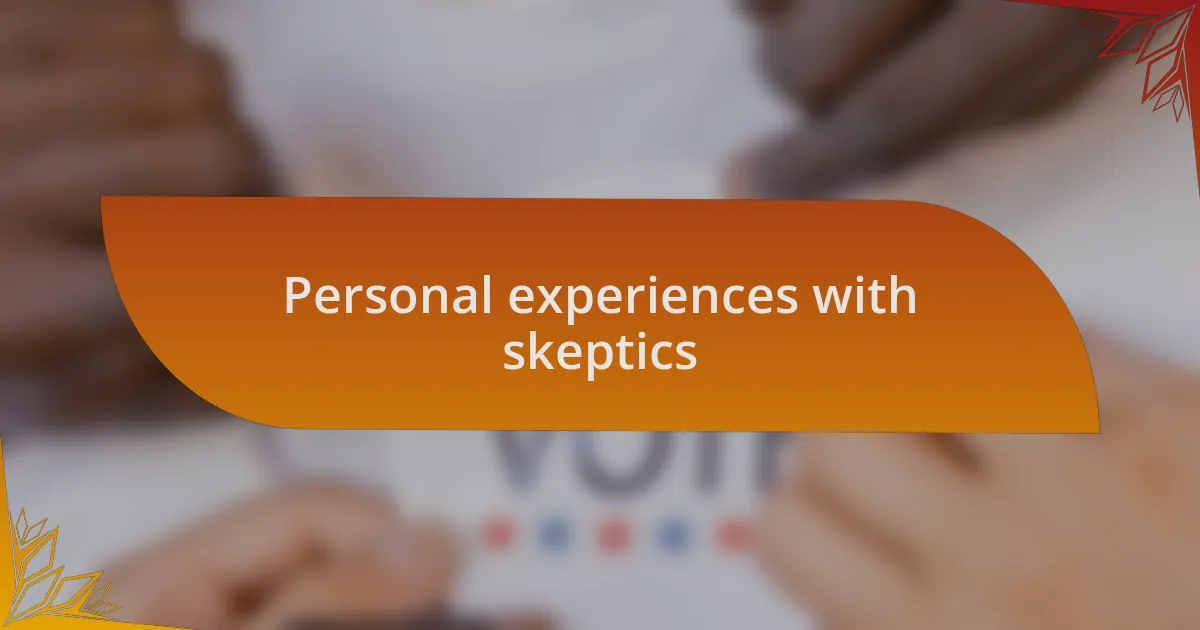
Personal experiences with skeptics
Engaging with skeptics has often been a delicate dance for me. I remember a heated discussion with a friend who questioned the fairness of reparations. Instead of getting defensive, I shared my grandmother’s experience of displacement, and it seemed to change the atmosphere. Isn’t it interesting how personal stories can pierce through layers of skepticism, allowing for a more profound connection?
Another moment that stands out took place during a workshop I facilitated. One participant, clearly unconvinced about the necessity of reparations, expressed frustration over how it might affect his community. I found it enlightening to explore this apprehension together, helping him see the potential for healing and economic revitalization. How often do we miss opportunities to address fear with open dialogue instead of conflict?
In conversations like these, I’ve learned to embrace vulnerability. When I shared my own uncertainties about the reparations process, it created a safe space for others to voice their doubts as well. This mutual sharing of fears fostered a sense of camaraderie. Isn’t it powerful when we can transform skepticism into an opportunity for growth and understanding?
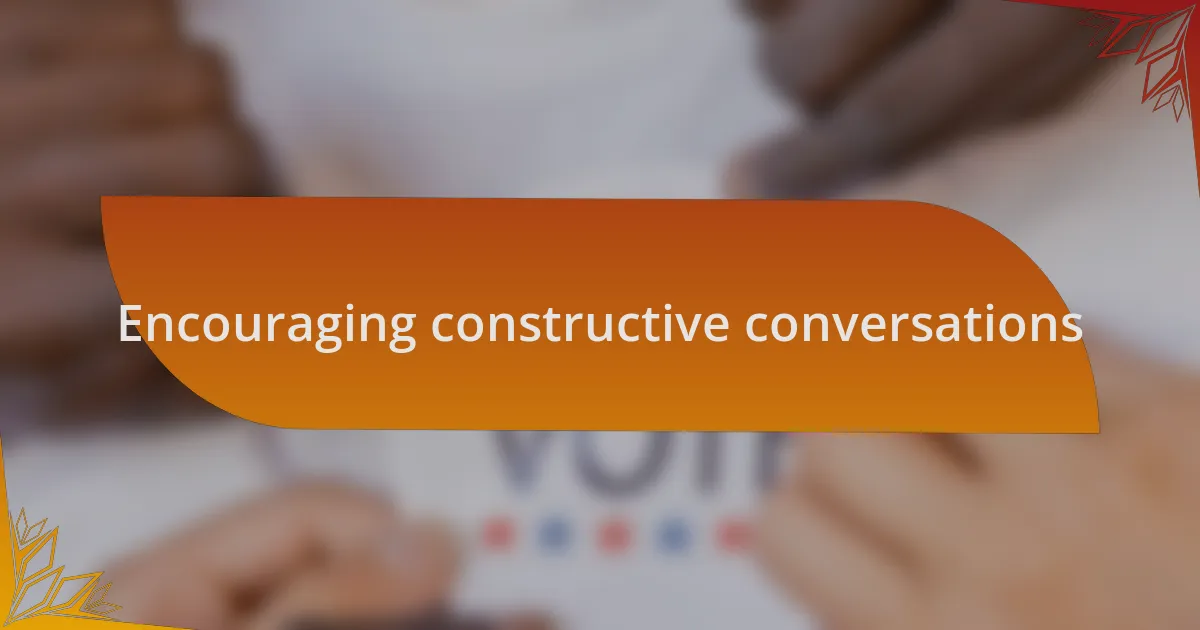
Encouraging constructive conversations
Encouraging constructive conversations with skeptics often requires a gentle approach. Recently, I found myself at a community gathering, where a skeptic challenged the very idea of reparations. Rather than bypassing this discomfort, I leaned into it, asking him what specific concerns he had. By actively listening, I discovered many of his fears were rooted in a lack of information, which opened the door for an informative dialogue.
In another instance, I joined a group discussion where skepticism ran high. One participant shared a personal story about a perceived threat to their neighborhood’s stability due to policy changes. I instinctively recognized this touchpoint—by relating it to how reparations could foster community improvements and not just financial compensation, I could bridge our different perspectives. Isn’t it fascinating how shared concerns can transform opposition into collaborative understanding?
Moreover, I continually remind myself of the importance of patience in these exchanges. During a recent family dinner, a relative raised their doubts about reparations due to a family ethos of self-reliance. Instead of dismissing their viewpoint, I took a moment to uncover their expectations. It was then I realized that addressing the core values behind their skepticism made our conversation more meaningful. Have you ever experienced how the right questions can lead to unexpected insights?